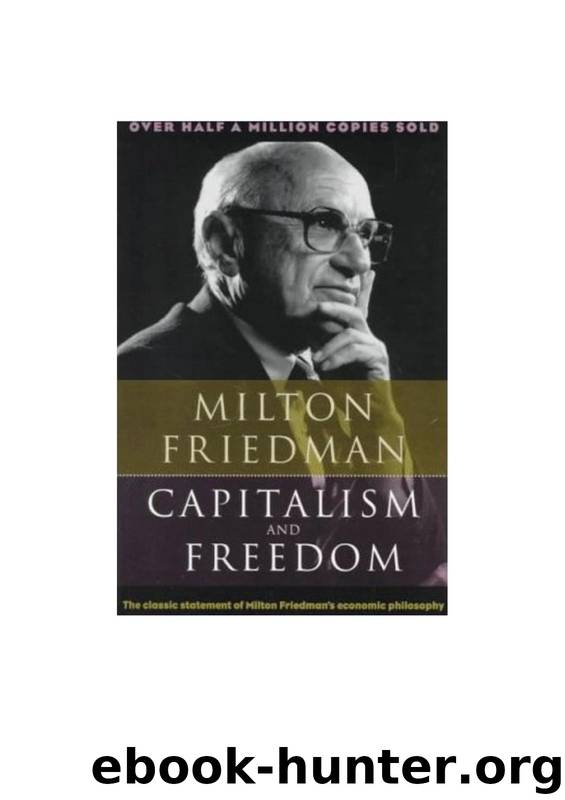Capitalism and Freedom by Milton Friedman

Author:Milton Friedman
Language: eng
Format: mobi, epub, pdf
Published: 0101-01-01T00:00:00+00:00
92
Chapter VII
Capitalism and Discrimination
It is a striking historical fact that the development of capitalism has been
accompanied by a major reduction in the extent to which particular religious,
racial, or social groups have operated under special handicaps in respect of their
economic activities; have, as the saying goes, been discriminated against. The
substitution of contract arrangements for status arrangements was the first step
toward the freeing of the serfs in the Middle Ages. The preservation of Jews
through the Middle Ages was possible because of the existence of a market
sector in which they could operate and maintain themselves despite official
persecution. Puritans and Quakers were able to migrate to the New World
because they could accumulate the funds to do so in the market despite
disabilities imposed on them in other aspects of their life. The Southern states
after the Civil War took many measures to impose legal restrictions on Negroes.
One measure which was never taken on any scale was the establishment of
barriers to the ownership of either real or personal property. The failure to
impose such barriers clearly did not reflect any special concern to avoid
restrictions on Negroes. It reflected rather, a basic belief in private property
which was so strong that it overrode the desire to discriminate against Negroes.
The maintenance of the general rules of private property and of capitalism have
been a major source of opportunity for Negroes and have permitted them to
make greater progress than they otherwise could have made. To take a more
general example, the preserves of discrimination in any society are the areas
that are most monopolistic in character, whereas discrimination against groups of
particular color or religion is least in those areas where there is the greatest
freedom of competition.
As pointed out in chapter i, one of the paradoxes of experience is that, in
spite of this historical evidence, it is precisely the minority groups that have
frequently furnished the most vocal and most numerous advocates of
fundamental alterations in a capitalist society. They have tended to attribute to
capitalism the residual restrictions they experience rather than to recognize that
the free market has been the major factor enabling these restrictions to be as
small as they are.
We have already seen how a free market separates economic efficiency
from irrelevant characteristics. As noted in chapter i, the purchaser of bread does
not know whether it was made from wheat grown by a white man or a Negro, by
a Christian or a Jew. In consequence, the producer of wheat is in a position to
use resources as effectively as he can, regardless of what the attitudes of the
community may be toward the color, the religion, or other characteristics of the
93
people he hires. Furthermore, and perhaps more important, there is an economic
incentive in a free market to separate economic efficiency from other
characteristics of the individual. A businessman or an entrepreneur who
expresses preferences in his business activities that are not related to productive
efficiency is at a disadvantage compared to other individuals who do not. Such
an individual is in effect imposing higher costs on himself than are other
individuals who do not have such preferences. Hence, in a free market they will
tend to drive him out.
Download
Capitalism and Freedom by Milton Friedman.epub
Capitalism and Freedom by Milton Friedman.pdf
This site does not store any files on its server. We only index and link to content provided by other sites. Please contact the content providers to delete copyright contents if any and email us, we'll remove relevant links or contents immediately.
| Anarchism | Communism & Socialism |
| Conservatism & Liberalism | Democracy |
| Fascism | Libertarianism |
| Nationalism | Radicalism |
| Utopian |
The Secret History by Donna Tartt(19085)
The Social Justice Warrior Handbook by Lisa De Pasquale(12190)
Thirteen Reasons Why by Jay Asher(8909)
This Is How You Lose Her by Junot Diaz(6885)
Weapons of Math Destruction by Cathy O'Neil(6279)
Zero to One by Peter Thiel(5801)
Beartown by Fredrik Backman(5751)
The Myth of the Strong Leader by Archie Brown(5507)
The Fire Next Time by James Baldwin(5442)
How Democracies Die by Steven Levitsky & Daniel Ziblatt(5218)
Promise Me, Dad by Joe Biden(5153)
Stone's Rules by Roger Stone(5087)
A Higher Loyalty: Truth, Lies, and Leadership by James Comey(4960)
100 Deadly Skills by Clint Emerson(4924)
Rise and Kill First by Ronen Bergman(4788)
Secrecy World by Jake Bernstein(4752)
The David Icke Guide to the Global Conspiracy (and how to end it) by David Icke(4717)
The Farm by Tom Rob Smith(4507)
The Doomsday Machine by Daniel Ellsberg(4490)
